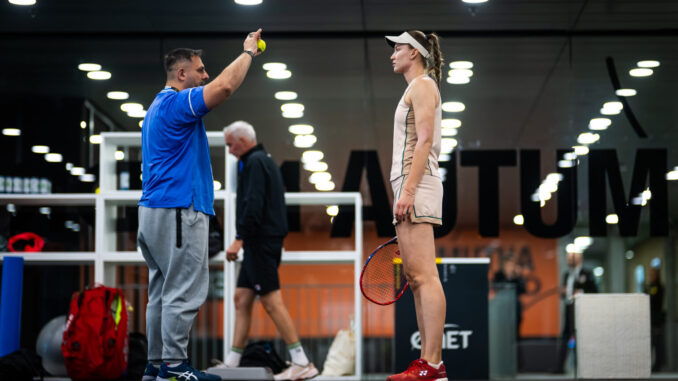
Elena Rybakina, the powerful Kazakhstani tennis player, has provided insight into the composition of her new coaching team and the strategic adjustments made to her schedule in the crucial lead-up to the French Open. Her recent statements shed light on her ongoing quest for stability and peak performance, particularly after a period marked by significant coaching changes and persistent injury concerns.
The coaching landscape surrounding Rybakina has been a topic of considerable discussion in recent months. After a long-term partnership with Stefano Vukov, which saw her claim the Wimbledon title in 2022, their professional relationship ended before the US Open last summer. A brief, yet highly anticipated, trial period followed with Goran Ivanisevic, Novak Djokovic’s former coach, leading up to and including the Australian Open. However, that collaboration ultimately proved short-lived.
In a recent development, Rybakina has brought in Italian former player Davide Sanguinetti to her coaching staff. Sanguinetti, who has coached various players on both the WTA and ATP tours, including a stint with Dinara Safina, is now traveling with Rybakina to tournaments. This move comes amid complexities surrounding Vukov, who, despite his history with Rybakina and her desire for him to remain involved, is currently provisionally suspended by the WTA due to an ongoing investigation into a potential breach of their code of conduct.
Rybakina has openly expressed her dissatisfaction with the WTA’s handling of the Vukov situation, stressing her belief that his suspension was not properly managed. “I’m just disappointed with the situation, and how the process went,” she remarked. She further emphasized the importance of a player’s perspective in such matters: “At the end of the day I think you need to listen to the player, that’s the most important.” She also pointed out that many “comments from people which are also in our environment but they’re making comments not knowing me, not knowing him, and just making it look bad for everyone.”1
Despite Vukov’s inability to be physically present on the practice courts due to the suspension, Rybakina confirmed that he remains an “important person” in her career. “We started when I was like 200 [in the world],” she noted, highlighting his significant role in her ascent. She also revealed that communication between Vukov and Sanguinetti is ongoing, and they even spent time together during a recent training block in Dubai after the Australian Open. “I feel like of course it’s not ideal that he cannot be on the practice courts, but at the same time we are finding a way also with help of Davide, his opinion,”2 she stated, expressing optimism: “I hope it’s going to work out. We have a good team.”
Beyond the coaching dynamics, Rybakina’s pre-French Open schedule has also seen adjustments. Notably, she accepted a wildcard entry into the WTA 500 Strasbourg Open just a week before Roland Garros. This strategic decision follows an unexpected early exit from the Rome Open, where she had a challenging start to the clay-court season. With only a limited number of matches under her belt recently, having two wins and two losses at the Madrid and Rome Opens, the move to Strasbourg is a clear attempt to gain crucial momentum and confidence on clay before the second Grand Slam of the year.
The Strasbourg Open offers a vital opportunity for Rybakina to fine-tune her skills and get valuable match practice on a surface that has historically been less favorable for her, though she has shown significant improvement on it this season. Her recent withdrawal from the Stuttgart Open, which she had won the previous year, also played a role in her adjusted schedule, as it meant a loss of significant ranking points.
Rybakina has also been vocal about the broader WTA Tour calendar, suggesting that players should have more freedom in choosing their tournaments. She has criticized the expansion of WTA 1000 events to two weeks, arguing that it’s “not very helpful” for player welfare. “To stay in one place for almost two weeks, and it’s not like here you finish and you go rest. You go and you play another mandatory one. That’s definitely not making it easy,”3 she commented. She also expressed frustration with the “new rule of change” that includes “a lot of mandatory stuff where you cannot really choose and pick what you want to play.”
Despite the off-court challenges and schedule adjustments, Rybakina’s determination to succeed remains evident. Her focus is squarely on her game, and she is committed to making the most of her current team setup as she aims for a strong showing at the French Open.
Leave a Reply